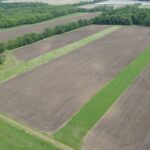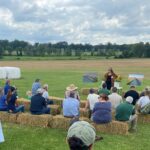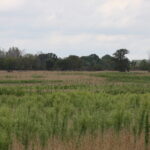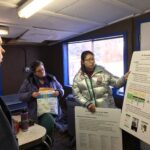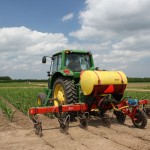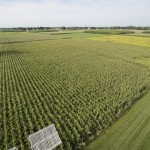CASSOPOLIS, Michigan— A farm field day centered on prairie strips and soil health will be held on Friday, August 26th (September 2nd rain date) from 1:00- 3:00 p.m. at the Edward Lowe Foundation. The field day will feature speakers including farmers, land managers, and soil scientists who will describe the implementation, management, and soil health benefits associated with on-farm prairie strips. The event is free and open to the whole family and will include a soil pit demonstration, a wagon tour of prairie strips and refreshments. This field day is supported by Michigan State
Kellogg Biological Station joins multi-state effort to increase the adoption of prairie strips across the Midwest
Before there were the gently rolling hills of farmland and forest we see today, southwest Michigan’s landscape included large areas of prairie habitat. Dominated by wildflowers, grasses, and sedges, these habitats were maintained by periodic fires and included oak barrens, dry sand prairies, and wetland prairies. Today, only a few remnants of Michigan’s historical prairies remain on the landscape. Prairie strips, a conservation practice in row crops that protects soil and water while providing habitat for wildlife, are one way to restore these habitats to the
Herbicide resistant weeds threaten conservation agriculture
East Lansing, MI – Soybean farmers are turning away from conservation agriculture practices that protect soil and environmental health to manage herbicide resistant weeds, say researchers in Michigan State University’s (MSU) Department of Agricultural, Food, and Resource Economics (AFRE). In a new study published in the American Journal of Agricultural Economics, Braeden Van Deynze (now a postdoctoral research associate at the University of Washington), Scott Swinton (MSU), and David Hennessy (MSU), examined the herbicide and tillage records of thousands of soybean farmers across the United
Supporting Michigan farmers using soil health assessment tools: Reflections from an LTER fellow
Graduate researcher, Xinyi Tu, is a graduate student advised by Dr. Sieglinde Snapp in the Department of Plant, Soil and Microbial Sciences Department at Michigan State University (MSU). The term “soil health” is similar to that of the health of an organism – it originates from the underlying connection of soil to animal and human health, and to the connection between soil and its living biota. However, there is no concensus amongst scholars as to what soil health means, and various definitions can be found in the literature. This confusion translates to farmers through the creation
Fertilizing to help the planet
This news piece by KBS LTER volunteer and retired journalist Bill Krasean. Researchers at Michigan State University's Kellogg Biological Station (KBS) Long-term Ecological Research (LTER) program have helped develop a way for farmers to reduce crop-related emissions of a greenhouse gas while potentially lowering fertilizer costs, maintaining crop yields, and getting paid to do so. KBS scientists have developed a program to reduce farm-related emissions of nitrous oxide (N2O), a potent greenhouse gas that also destroys ozone in the stratosphere. Using data collected from Michigan farms,
KBS LTER researchers find way for farmers to participate in carbon markets
Via MSU News, news.msu.edu EAST LANSING, Mich. — Researchers at Michigan State University have helped develop a way for farmers to participate in carbon markets and get paid to reduce their use of nitrogen fertilizer, which represents one of the largest sources of greenhouse gas emissions from agricultural production. The methodology, which was developed for the American Carbon Registry with support from the Electric Power Research Institute, will allow farmers to participate in carbon markets by creating greenhouse gas offsets by reducing the amount of nitrogen used to fertilize crops.
